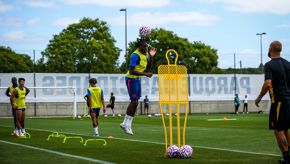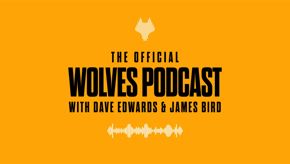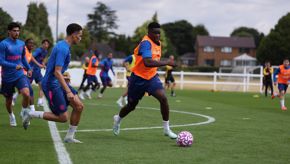If Manchester City were to be victorious over Watford in the FA Cup final tomorrow evening, Wolves would enter the second qualification round of the Europa League – a competition the club haven’t played in since the 1980/81 season.
Although Nuno Espirito Santo already operates with the smallest squad in the Premier League, Shi believes that qualification would not demand an influx of additional first team players, but would instead put a greater focus on quality players in the under-23s and under-18s.
On potential Europa League qualification
“We would be happy, of course, but it’s also something we would have to think about carefully. It would change the whole process, because if you qualify for the Europa League, the games will start very soon.
“If you haven’t got that, you can take a rest and then the players will come back to the training camp and then we start again. But if you have more games to play, if you want to go to the group stages, for example, you will have six games to play. It means the training methods may have to be tweaked.
“It would be a challenge, but you would also be on a stage in Europe. It will improve the profile of the club and the players - so long term, it would be a good thing for us, in general it’s a good thing. But from my view, I’m always thinking about the challenge and how to tackle that.
“Of course, the fans would be happy, but we would have to think carefully about how to do the job.”
On how Europa League qualification will affect squad size
“I have talked with Nuno and he thought the philosophy will be the same. We will still try to keep a small squad and will not think that because we have one more tournament to compete in, we will have to get more players, because if you go out of the tournament early you then have to think about how you deal with them.
“We will not do this kind of thing, we will still try to keep a short squad – as Nuno wants – but in the meantime, it requires higher quality from our Academy players because sometimes what you need is them; they can step up, they can help the team.
“If we go to Europe – fingers crossed – I don’t think it will just be about improving the first-team. It’s about improving the squad for our under-23s and under-18s so they will be ready when we need them.”
On success spreading throughout the club
“I think the competitiveness of a club is about everything. It’s not only about the first team and especially if you have a long-term plan. If you have only a first team it’s not so helpful because even though the first-team will have good moments, the Academy is the foundation for everything.
“We are always talking about a ten-year plan, so if you are talking about that then you need a very good Academy to support the long-term development.
“In my view, the Academy may be the second most important thing at the club. I always talk with Scott [Sellars] and we are talking about the strategy for the Academy, how to make the Academy much better than it is now because you can still see a big gap between us and the top six regarding the youth training and the players.
“We are talking about how to improve that because sometimes the performance of the first-team will fluctuate, but if you have a strong Academy, getting better and better, you will always be comfortable in your heart because you have a strong foundation and when we need the young players, they can do the job. That’s very important to us.”
On bringing through talented Academy players
“Generating revenue is not the goal for the Academy. One of the goals for the Academy is trying to make financial balance and internally we have a kind of virtual financial statement for the Academy where they are operating more independently.
“For example, when we have a young player from the Academy that goes into the first-team, we assume we are selling the player from the Academy to the first-team. When we give the player a price tag, we will calculate how much benefit there is for the first-team from the Academy, so the revenue will go to the Academy.
“This gives Scott a big challenge of how to make the Academy more independent and more like a business unit. But in the meantime, the more players who go through to the first-team, the more it will help the financial statement.”
To watch Wolves TV's full interview with Jeff Shi:
- Click here for part one
- Click here for part two












